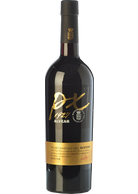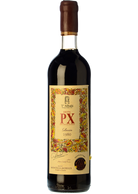Pedro Ximénez
The popular Pedro Ximénez grape involves a certain mystery. Behind its name hides an uncertain origin about which much has been debated. Pedro Ximénez seems to be a proper name equivalent to Pedro Jiménez, adapted to the sonority of the Portuguese language.

Ximénez-Spinola PX Delicado Cosecha 2023 (0.5 L)

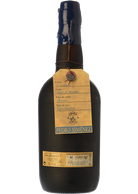






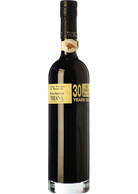
Hidalgo La Gitana PX Triana Viejo 30 años VORS (0.5 L)
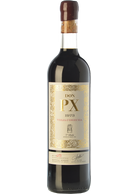
Pedro Ximénez
The popular Pedro Ximénez grape involves a certain mystery. Behind its name hides an uncertain origin about which much has been debated. Pedro Ximénez seems to be a proper name equivalent to Pedro Jiménez, adapted to the sonority of the Portuguese language.
The name probably comes from southern Spain, the area where most of the vines of the variety are grown. It seems that, when the wine was exported from Andalusia to Brazil, the surname Jimenez was adapted to the local language and transcribed as Ximenez.
There is another plausible theory that explains that a soldier would have brought the grape from the German region of the Rhine to Spain, and even that Pedro Ximénez and Riesling could be very close grapes. It is hard to believe this theory, especially if we look at the cold German climate, where it does not seem that PX could thrive.
Although this could be due to an adaptation of the variety to the environment, it seems much more logical that the sweet white grape developed in the warmth of Andalusia, a land where there is evidence of its cultivation since the 17th century.
Inevitably linked to the sweet and generous Andalusian wines, the Pedro Ximénez grape offers a high alcohol content and diverse winemaking possibilities, from dry whites to distillates.
In the Catalan Priorat, for example, it participates in many blended wines, contributing its particular character to great white wines made from white Grenache or Macabeo.
The PX grape is valued for its large bunches of thick skin, its regular growth and its fragrant and tasty flesh. It also withstands high temperatures very well and is capable of ripening to high degrees, concentrating spicy aromas of quince jam and candied ginger.










